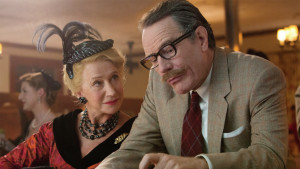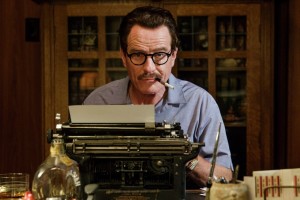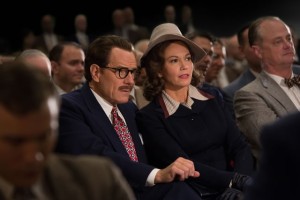In Trumbo, Bryan Cranston portrays legendary Hollywood screenwriter Dalton Trumbo (Roman Holiday, Spartacus), a man who was part of the notorious Hollywood 10. They were ten brilliant minds who were blacklisted for their perceived participation in anti-American communist activities.
The film triumphs Trumbo, in particular, as a renegade who refused to accept his unlawful punishment and responded to his blacklisting by writing under aliases and saying that he could change the system, not by backing away, but by continuing to work within it.
Cranston admitted at a recent press day for Trumbo that although the masses might never have heard of Dalton Trumbo, it was just as important to capture the persona as impeccably as a celebrated soul, such as another real life person that Cranston has played, President Lyndon Johnson.
For him, it started with the voice, but that was merely the tip of the iceberg.
“There is a lot of source material and videotapes and audiotapes on that. But you can kind of get lost in that and if you only focus on that you could start down a road of interpretation. And so I wanted to be very careful not to do that. That being said, he was a very flamboyant character with contradiction and irascibility and passion he was very prolific. He was a beautiful, wonderful big character and dramatic,” Cranston said.
“[You] talk to the people that knew him. You are almost like a detective assembling clues. It’s a puzzle.”
Cranston also said that the screenplay for Trumbo made his job a lot easier. “The script is always the first thing that attracts an actor, the story and the script that supports it. And they don’t often go together. Sometimes you have a great story and the script kind of falls short of realizing the full potential, or vice versa. This was A-plus on both of those,” Cranston said.
With a solid script in tow, Cranston zeroed in on the person behind the headlines, and it’s hard to find one that is more larger than life than Dalton Trumbo. “This character was phenomenal. It was huge and dangerous and scary and all that, and important,” Cranston said. “It was an easy “yes” for me.
There were a few challenges that had nothing to do with professional skill for Cranston. His character smokes cigarettes throughout the entire film, and spends hours upon hours in the bath (where Trumbo famously wrote his scripts).
“Then, the cigarettes… I stupidly thought that well I’ll definitely not smoke real cigarettes because then I’ll protect myself from ingesting nicotine and tar and all the carcinogens. But then I realized I’m still inhaling smoke, I’m still smoking these herbal cigarettes. But if you have a cigarette in your hand and you’re playing that character, even if you are off screen, I’m not focusing on not inhaling I’m focusing on doing the scene and so I catch myself inhaling even off screen and so it became and issue a little bit. Getting hoarse and not feeling great, it was a challenge,” Cranston said.
“The challenge of working in a bathtub is not to get pruney fingers. Not to drink too much before you get into the bathtub. You know what I mean? It becomes very pragmatic when you think about it.”
Trumbo works so well also because it reminds us that yes freedom is not free, but that it comes with a high cost. Personal destruction reared its ugly head during the Communist witch hunt, and Trumbo and many of his contemporaries paid the price. Cranston was thrilled that Hollywood once again shined a spotlight on that ugly time in American history.
“I think embedded in the story is definitely a cautionary tale. The film, first and foremost, is entertainment, and I think through entertainment we will have more people possibly taking the message that is behind it,” Cranston said.
“I think anytime that a government sets out to oppress civil liberties that the citizens need to be very concerned about that, speak out, and stand up for their rights. So that is the cautionary tale. Hopefully, this generation, the younger generation, will be able to learn by that and remember that, and see its parallels when they pop up.”




